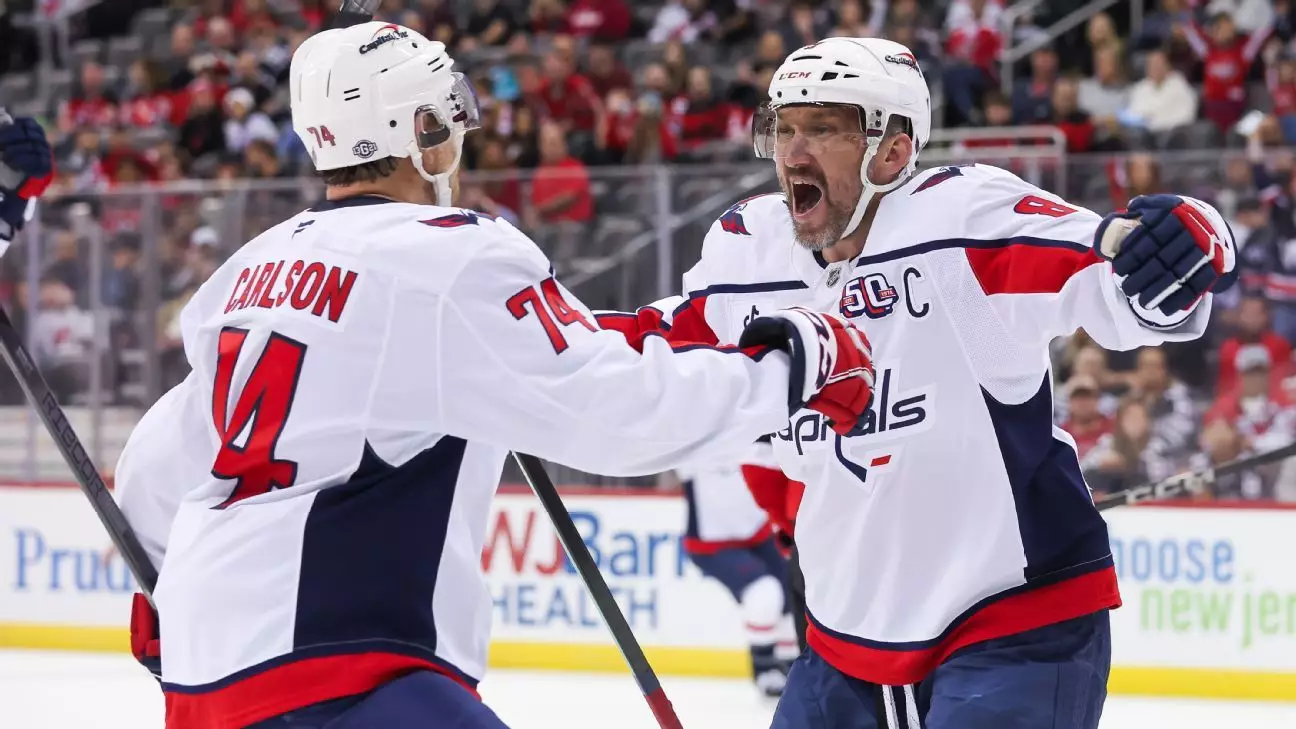The Washington Capitals find themselves in a precarious situation following the announcement that their captain, Alex Ovechkin, will miss four to six weeks due to a fractured left fibula. This injury not only halts Ovechkin’s chase for Wayne Gretzky’s all-time goals record of 894 but also poses significant challenges to the Capitals’ current season. With Ovechkin having registered 868 goals before this injury, the belief was that he was on track to break the record as early as December or January. However, the realities of professional sports often come crashing down, and this situation exemplifies the unpredictability of injuries in the NHL.
Injuries are an inevitable part of any athlete’s career, but the severity of Ovechkin’s injury casts a long shadow over the Capitals. A fractured fibula can be tricky to recover from; it not only requires physical healing but also psychological readiness to return to competitive play. Ovechkin, known for his impressive durability throughout his 20-season career, has only missed 35 games due to injury, an astonishing statistic that further amplifies the shock among teammates regarding his current condition. Players such as Tom Wilson have openly expressed their disbelief, signaling just how integral Ovechkin is to the team both on and off the ice.
While his teammates expressed disappointment at losing him, it is essential to recognize how they will need to adapt moving forward. The mental component of Ovechkin’s recovery cannot be understated; he needs to regain confidence in his mobility and ability to withstand physical contact. The challenge becomes even greater considering his age and the demands of playing at the professional level.
The Capitals currently sit in second place in the Metropolitan Division, only a single point behind the Carolina Hurricanes. Ovechkin’s absence leaves a substantial void in the lineup, especially when he was projected to be one of the league’s leading scorers this season. His performance up to this point indicated that he could have hit a career-high of 68 goals, which now seems increasingly unattainable.
As coach Spencer Carbery looks to rearrange his lines, options like Connor McMichael, Pierre-Luc Dubois, and Tom Wilson will need to elevate their gameplay. Notably, while McMichael and Protas have been productive, the onus may fall heavily on Dubois, who has thus far struggled to find the net with only one goal in the first 18 games. If the Capitals want to maintain their competitive edge and scoring rate of 4.33 goals per game, these players must step up significantly.
Beyond immediate game performance, Ovechkin’s absence could impact team morale and cohesion. The dressing room atmosphere has been heavily influenced by Ovechkin’s quest for the goals record, which provided a collective sense of purpose among players. The leadership group, including veterans like John Carlson, now faces the daunting task of ensuring that the energy and enthusiasm surrounding Ovechkin’s pursuit do not vanish. The players need to rally and maintain focus despite the loss of their captain.
Historically, teams often struggle when losing their highest-scoring player, lacking the target that motivates them to synchronize their efforts on the ice. The Capitals need to find ways to channel the resolve that has characterized their play thus far, even without their star player leading the charge.
The timeline for Ovechkin’s return is bracketed between December 20 and January 2, with varying scenarios regarding how missing 13 to 18 games will affect his goal-scoring rate for the remainder of the season. If he returns before the Christmas break, he would have 51 games to pursue the record. However, if he waits until January, that number drops to 43 — a significant difference considering he would need to average between 0.49 to 0.58 goals per game to remain on track.
Should Ovechkin fail to hit those averages, the likelihood of him surpassing Gretzky’s record during this season diminishes significantly. Such a reality would not only impact his personal legacy but also the team’s aspirations. Nevertheless, history shows that champions often find ways to adapt and overcome setbacks, and if Ovechkin returns healthy, he might yet have the opportunity to achieve the records he so fervently pursues.
Ultimately, Alex Ovechkin’s injury represents more than just a physical setback; it reflects the fragile nature of competitive sports where one moment can change the trajectory of an entire season. The Capitals must move forward without their captain while maintaining their competitive spirit and cohesion. Whether Ovechkin can reclaim his scoring prowess upon his return remains to be seen, but for now, the team must harness their collective strengths to overcome this challenging period. As they navigate through this adversity, only time will reveal the true impact of Ovechkin’s absence on their season and legacy.

